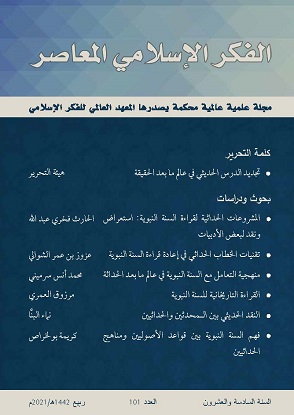Abstract
This study is an attempt to capture two methodologies that share their ability to understand the Sunnah of the Prophet and explain its specificities by reason, yet differ in terms of principles and approaches. Approaching the Sunnah and the methods of understanding it, whether for Islamic legal theory or the modernist school, is not confined to merely evoking hadiths and understanding their anecdotal and even practical implications. Rather, it is necessary before that to understand the nature of the Sunnah and how to apply it in terms of acceptance and application. This is dealt with based on three issues: the issue of revelation, the explanation of the nature of the Sunnah in terms of its source, and the particularities of the Sunnah. Whereas the uṣūliyūn (scholars of Islamic legal theory) emphasize the unseen nature of the Sunnah (though with certain exceptions), modernist thought tends to problematize this and demands that it be subjected to criticism and questioning. The issue regarding the validity of deploying the Sunnah as a sacred source of evidence provokes the debate concerning the authenticity of narrated hadith reports. Even if these narrations were determined by the uṣūliyūn to be mutawātir (massively transmitted and therefore of the highest classification of narrated reports) or close to it, this issue [of deploying the Sunnah as evidence] remains to be accepted by modernists as long as the context that affected the documentation of the Sunnah (i.e., environment, causes, variables, etc.) are unaccountable. For the uṣūliyūn, this matter of context in understanding the Sunnah has an impact on two levels: the scope of application and the manner of application. As for the modernist camp, its research in understanding the Sunnah has been directed towards explaining the impact of context on the formation of hadith and in terms of the hadith being confined to its historical context, thus justifying the historicization of the Sunnah.





